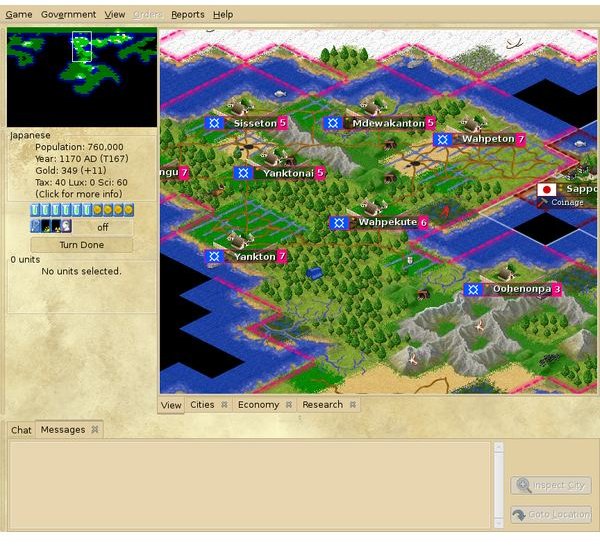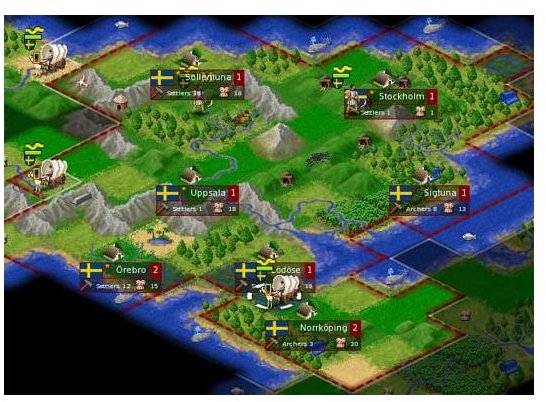Freeciv Review: Civilization for Free?

The Civilization series of games is undoubtedly the most successful and most influential line of turn-based strategy games ever created. There is an instant appeal to the idea of creating an empire in one’s own image. The cities can be placed where you want them. The military can have the units you want. Research can be done on the subjects you find interesting. It is the ultimate game of control, but it is also the ultimate game of strategy, because your choices can lead to national disaster just as easily as they can lead to national glory.
As a result of Civilization’s success there have been many knock-offs over the years, but none are so blatant as Freeciv. Anyone who has ever played Civilization II will know instantly that Freeciv is essentially a freeware revival of that classic strategy game, using most of the same mechanics, units, and technologies. Yet not everything remains the same, and there lies the danger.
Gameplay (3 out of 5)
The first thing any player will notice when opening Freeciv is that its imitation of Civilization II is extremely exact and detailed. The game defaults to an isometric view over a 2D landscape, just like Civilization II. The beginning of the game is also similar, as the player defaults with a settler, some works, and an explorer. From there, the future is in the hands of the player.
At it’s default settings, Freeciv’s gameplay and nearly identical to Civilizations II from start to finish. The units, technologies, goals and diplomatic options are nearly identical. This is not a bad thing. Civilization II lacks many of the gameplay advances made by later Civilization titles, but there is beauty in simplicity as well. Freeciv does not feel refined, and in comparison to many modern turn-based civilization management games it feels very game-y. There are many instances where actions required by the player to be successful seem to have nothing to do with reality and are required simply because of the game rules. In a strange way, however, this makes Freeciv quite easy to understand. The game is extremely straight-forward about what everything in the game is for, creating a stream-lined experience that can be played as quickly or as slowly as the player desires.
It isn’t all roses, however. Civilization II is an old game, and some of the advances made since its release were sorely needed. One of the most obvious is combat. Civilization II was notorious for a combat system that would on occasion allow medieval archers to defeat a unit of tanks, and Freeciv does little to improve the situation. There are no culture victories here, either, and diplomacy is near useless. This means that the games quickly develop into slug-fests. This isn’t helped by an AI that, at higher difficulty levels, seems to exist purely to slit the player’s throat.
Longevity (3 out of 5)
Freeciv was released under the General Public License, and its source code is free for anyone to have. The game has more options than an antique shop does trinkets. Almost everything about the game can be changed. This includes obvious and interesting elements of gameplay such as technologies, units, sounds and graphics. But it also includes less obvious (and less interesting) features like the viewpoint, which can be switched to a top-down perspective. And then there is the really dreary stuff, which includes options like “Unit Movement Animation Time,” which apparently can adjusted by milliseconds. That’s nothing to what the hardcore can do, however, as the open source allows those with the knowledge of code-smithing the option to tweak the game infinitely.
Theoretically, all of this should make Freeciv a game that one could enjoy for years. Yet the game has so many options that it begins to drown in them. There are surely some users who have the time and inclination to tweak the game, but I don’t. I want a game which is good to play out of the box and stays good to play for a long time. Freeciv is not that game. While Freeciv does an excellent job of communicating the game’s mechanics, it does a horrible job of communicating its options. As a result, the average player will find that playing with Freeciv’s plethora of options is like playing with an unlabeled switchboard.
Oh, and there is multiplayer. Except that rounding up a crew of friends to play Freeciv multiplayer is about as likely as pizza raining from the sky, so it is hard to see why it was included.
Graphics and Sound (1 out of 5)

To an extent, the graphics and sound in Freeciv are as good or bad as the player wants them to be. Sounds and tilesets are fully customizable, and there are some good add-ons to be found. That said, trying to find a good tile-set (nevermind making your own) is its own game, and most players will want to use what Freeciv comes with.
That might be a problem, as Freeciv’s default graphics need a sack put over their head. These days one would expect that a 2D game will at least be crisp and clear, but the graphics of Freeciv look dull and muddled. They are so dull and muddled, in fact, that they can sometimes screw with the gameplay. The resources that can be found are the case in point, because most of them are not that easy to see at a glance. It is easy to build a city at what seems like the ideal location, only to realize a few turns later that there was a resource another tile over.
As for the sounds - sounds? Freeciv had some, but I couldn’t remember what they were without loading the game back up. Then I remembered that they were quite poor. For the most part, it’s better to just play with them turned off.
Verdict (2 out of 5)
Seeing that Freeciv is a copy of Civilization II, the question is one of comparison. Is Freeciv actually better than Civilization II?
I’m afraid not. While Freeciv is a noble effort, its open source roots are painfully obvious. Freeciv feels more like the chassis of a game than a finished game. After a few hours the problems become obvious. The AI is terrible. The graphics are poor. The interface is not well thought out. And most importantly, everything about the game feels like it was created in chunks by people who hardly communicated with each other about how they would fit the game together. Which, as Freeciv is the product of open source coding efforts, may not be far from the truth.
Still, the fundamental gameplay retains some of the charm of the Civilization games. Given that Freeciv is (of course) free, there is little reason for anyone looking to play a turn-based civilization management game to not give Freeciv an hour of their time. It is at least useful as a distraction, even if it does become stale surprisingly quickly.
